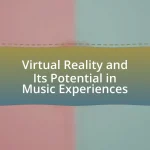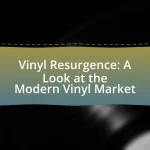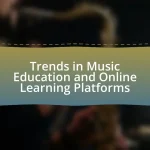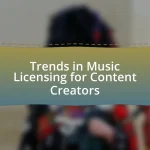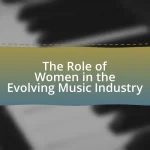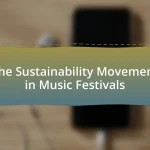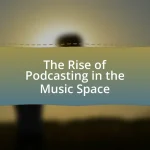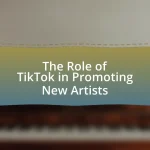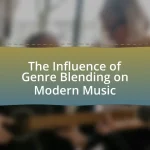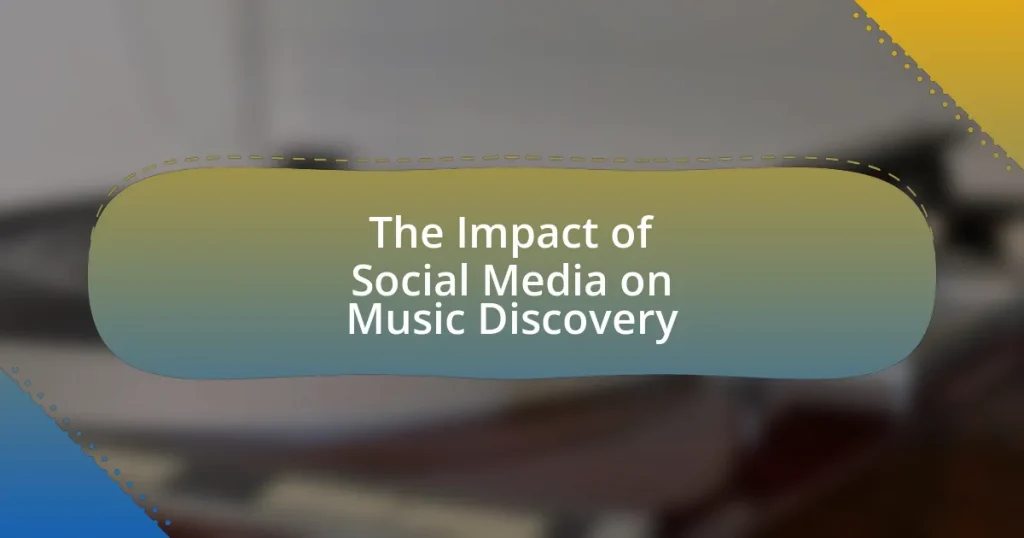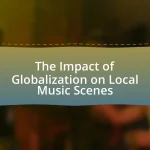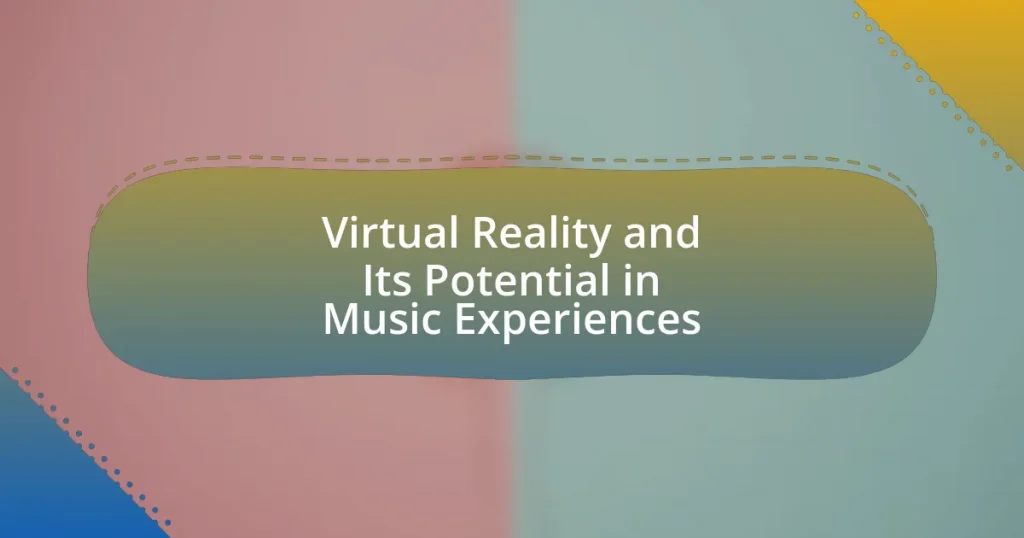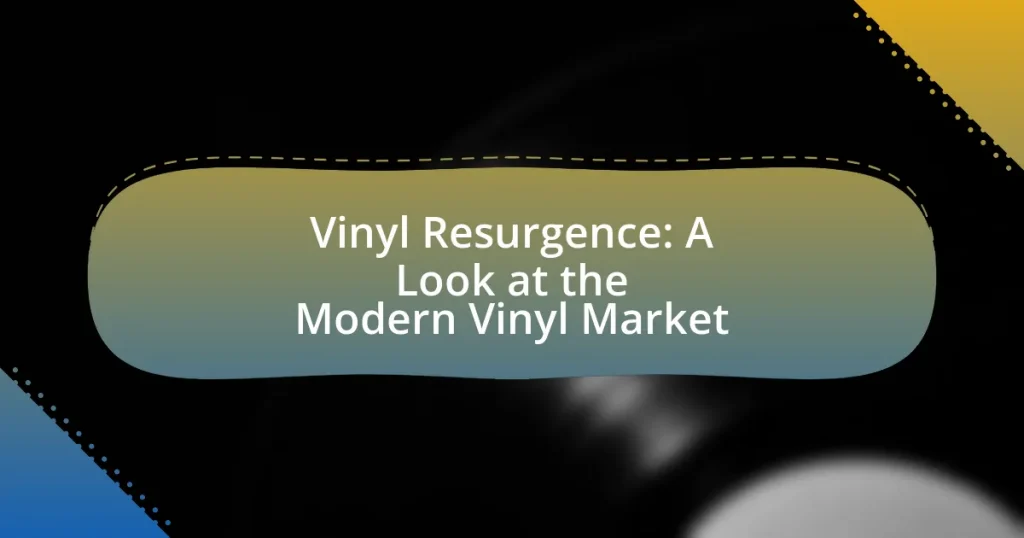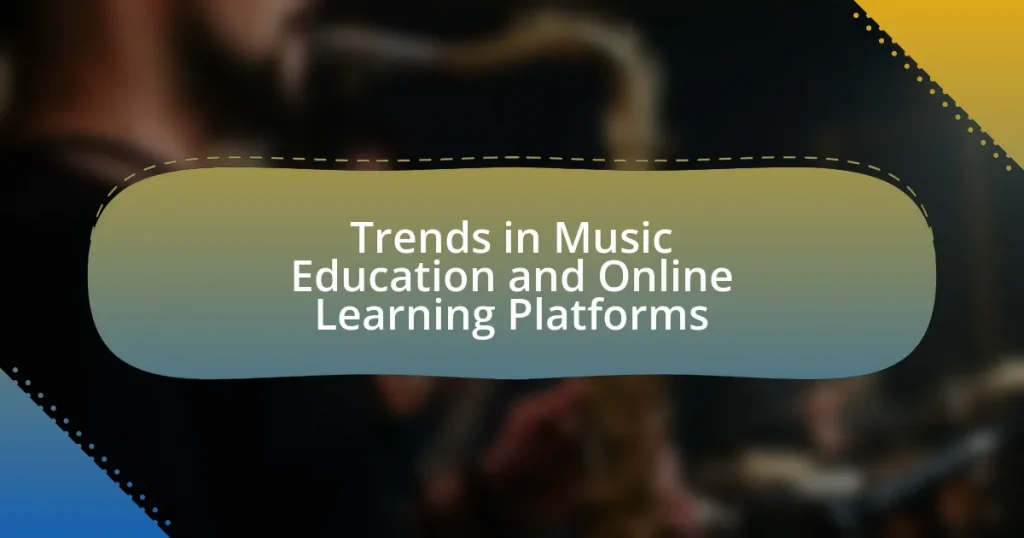The article examines the significant impact of social media on music discovery, highlighting how platforms like TikTok, Instagram, and Spotify facilitate the sharing and promotion of music. It discusses the transformative role of algorithms in shaping music recommendations and the importance of social media for emerging artists seeking visibility and engagement with fans. Key factors driving music trends, such as user engagement and viral challenges, are analyzed, along with the challenges of information overload and algorithmic bias. The article also outlines effective strategies for artists to leverage social media for music promotion and discovery.
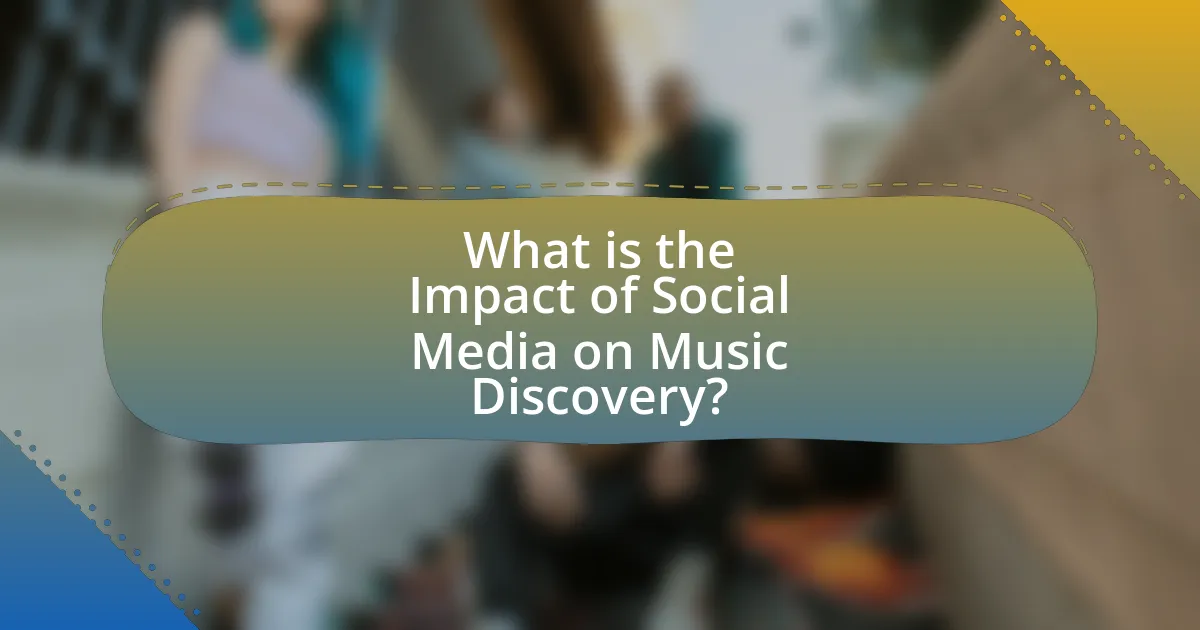
What is the Impact of Social Media on Music Discovery?
Social media significantly enhances music discovery by providing platforms for artists to share their work and for listeners to engage with new music. Platforms like Instagram, TikTok, and Spotify utilize algorithms that promote music based on user preferences and social interactions, leading to increased exposure for emerging artists. For instance, TikTok has been instrumental in popularizing songs, with tracks like “Old Town Road” by Lil Nas X gaining fame through viral challenges. Additionally, a study by the Pew Research Center found that 72% of teens use social media to discover new music, highlighting its role in shaping listening habits.
How has social media changed the way we discover music?
Social media has transformed music discovery by enabling users to access a vast array of music through platforms like Spotify, Instagram, and TikTok. These platforms facilitate the sharing of music content, allowing artists to reach audiences directly and enabling users to discover new music through recommendations, trends, and viral challenges. For instance, TikTok’s algorithm has propelled numerous songs to mainstream success, with tracks like “Old Town Road” gaining popularity through user-generated content. This shift has democratized music promotion, allowing independent artists to gain visibility without traditional gatekeepers, thus reshaping the music industry landscape.
What platforms are most influential in music discovery?
Streaming services like Spotify and Apple Music are the most influential platforms in music discovery. These platforms utilize algorithms and curated playlists to recommend new music to users, significantly shaping listening habits. According to a 2021 report by the International Federation of the Phonographic Industry (IFPI), 48% of music listeners discover new music through streaming services, highlighting their central role in the music discovery process. Additionally, social media platforms such as TikTok and Instagram have emerged as powerful tools for music promotion, with viral trends often leading to increased streams and chart success for artists.
How do algorithms on social media affect music recommendations?
Algorithms on social media significantly influence music recommendations by analyzing user behavior, preferences, and interactions to curate personalized content. These algorithms track metrics such as likes, shares, and listening habits, allowing platforms to suggest songs and artists that align with individual tastes. For instance, Spotify’s recommendation system utilizes collaborative filtering, which examines the listening patterns of similar users to enhance music discovery. Research indicates that 30% of Spotify’s streams come from algorithmically generated playlists, demonstrating the effectiveness of these algorithms in shaping user engagement and music exploration.
Why is social media important for emerging artists?
Social media is important for emerging artists because it provides a platform for visibility and engagement with potential fans. By utilizing social media channels, artists can share their music, connect with audiences, and build a personal brand without the need for traditional gatekeepers. According to a 2021 report by the International Federation of the Phonographic Industry, 80% of music listeners discover new artists through social media platforms, highlighting its critical role in music discovery. This direct access allows emerging artists to cultivate a following, receive immediate feedback, and promote their work effectively, thereby enhancing their chances of success in a competitive industry.
What role does social media play in artist promotion?
Social media plays a crucial role in artist promotion by providing a platform for direct engagement with fans and facilitating the sharing of music. Artists can reach a global audience instantly, allowing them to promote new releases, share behind-the-scenes content, and interact with followers, which enhances their visibility and fan loyalty. According to a 2021 report by the International Federation of the Phonographic Industry, 70% of music consumers discover new artists through social media platforms, highlighting its effectiveness in music discovery and promotion.
How do artists engage with fans through social media?
Artists engage with fans through social media by creating interactive content, sharing personal updates, and responding to fan comments. This direct interaction fosters a sense of community and connection, allowing fans to feel more involved in the artist’s journey. For instance, a study by the Pew Research Center found that 72% of teens use social media to connect with their favorite artists, highlighting the effectiveness of these platforms in building relationships. Additionally, artists often utilize live streaming features on platforms like Instagram and TikTok to host Q&A sessions, further enhancing engagement and providing fans with real-time interaction opportunities.
What are the challenges of music discovery on social media?
The challenges of music discovery on social media include information overload, algorithmic bias, and the prevalence of trending content over niche genres. Information overload occurs as users are bombarded with vast amounts of content, making it difficult to identify new music that aligns with their tastes. Algorithmic bias can limit exposure to diverse artists, as platforms often prioritize popular tracks, sidelining emerging musicians. Additionally, the focus on trending content can overshadow lesser-known genres, leading to a homogenized music landscape. These factors collectively hinder users’ ability to discover a wide range of music effectively.
How does information overload affect music discovery?
Information overload negatively affects music discovery by overwhelming listeners with excessive choices, leading to decision fatigue and reduced engagement. As platforms like Spotify and YouTube offer millions of tracks, users often struggle to find new music that resonates with them. Research indicates that when faced with too many options, individuals may experience anxiety and ultimately avoid making a choice altogether, which can hinder their exploration of new artists and genres. A study published in the Journal of Consumer Research found that consumers presented with a larger selection were less likely to make a purchase, illustrating how information overload can stifle the music discovery process.
What are the risks of relying solely on social media for music discovery?
Relying solely on social media for music discovery poses several risks, including exposure to algorithmic bias, misinformation, and a limited scope of musical diversity. Algorithmic bias can lead to a narrow selection of music, as platforms prioritize popular or trending content, potentially overshadowing emerging artists or niche genres. A study by the Pew Research Center found that 64% of social media users encounter misinformation, which can mislead listeners about the quality or relevance of certain music. Additionally, social media often emphasizes viral trends over artistic merit, which can result in a homogenized music landscape that lacks variety and innovation.
How does social media influence music trends?
Social media significantly influences music trends by enabling rapid sharing and discovery of new music among users. Platforms like TikTok and Instagram allow artists to reach wider audiences through viral challenges and user-generated content, which can propel songs to mainstream popularity. For instance, the song “Old Town Road” by Lil Nas X gained immense popularity after it went viral on TikTok, leading to its chart-topping success. Additionally, social media algorithms prioritize trending content, further amplifying songs that resonate with users, thus shaping the music landscape in real-time.
What are the key factors driving music trends on social media?
Key factors driving music trends on social media include user engagement, algorithmic recommendations, and viral challenges. User engagement, such as likes, shares, and comments, significantly influences which songs gain popularity, as seen with platforms like TikTok where tracks often go viral through user-generated content. Algorithmic recommendations personalize music discovery, as platforms analyze user behavior to suggest trending songs, enhancing visibility for emerging artists. Viral challenges, often initiated by influencers, create a collective experience around specific tracks, further propelling their popularity. For instance, the song “Savage Love” by Jawsh 685 and Jason Derulo gained massive traction through TikTok dance challenges, illustrating how these factors converge to shape music trends.
How do viral challenges and memes impact music popularity?
Viral challenges and memes significantly enhance music popularity by creating widespread engagement and visibility for songs. When a song is associated with a viral challenge, it often leads to increased streaming numbers and chart performance, as seen with tracks like “Savage Love” by Jawsh 685 and Jason Derulo, which gained immense popularity through TikTok challenges. Research indicates that songs featured in viral trends can experience a 200% increase in streams within a short period, demonstrating the direct correlation between social media trends and music consumption. This phenomenon illustrates how platforms like TikTok serve as powerful tools for music discovery, allowing artists to reach new audiences rapidly.
What strategies can artists use to leverage social media for music discovery?
Artists can leverage social media for music discovery by creating engaging content, collaborating with influencers, and utilizing targeted advertising. Engaging content, such as behind-the-scenes videos, live performances, and interactive posts, helps build a connection with audiences and encourages sharing, which increases visibility. Collaborating with influencers allows artists to tap into established fan bases, expanding their reach. Targeted advertising on platforms like Facebook and Instagram enables artists to promote their music to specific demographics, enhancing the likelihood of discovery among potential fans. According to a 2021 report by the International Federation of the Phonographic Industry, 75% of music listeners discover new music through social media platforms, highlighting the effectiveness of these strategies.
How can artists create engaging content on social media?
Artists can create engaging content on social media by utilizing visually appealing images, videos, and storytelling techniques that resonate with their audience. Engaging content often includes behind-the-scenes glimpses of the creative process, interactive posts such as polls or Q&A sessions, and regular updates that keep followers informed about new releases or events. Research indicates that posts with images receive 650% higher engagement than text-only posts, highlighting the importance of visual elements in capturing attention. Additionally, artists who actively respond to comments and messages foster a sense of community, further enhancing engagement.
What best practices should artists follow for effective music promotion on social media?
Artists should consistently engage with their audience, utilize targeted advertising, and share high-quality content for effective music promotion on social media. Engaging with followers through comments, live sessions, and polls fosters a sense of community and loyalty, which can lead to increased shares and visibility. Targeted advertising allows artists to reach specific demographics, enhancing the likelihood of attracting new listeners. Sharing high-quality content, including music videos, behind-the-scenes footage, and personal stories, captures attention and encourages sharing, which is crucial for organic growth. According to a study by the Pew Research Center, 72% of adults use social media, making it a vital platform for artists to connect with potential fans.
